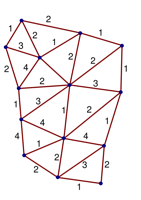I’m a sop for articles about fundamental physics. The October issue of Scientific American has an article about how loop quantum gravity might indicate that the universe didn’t start with the Big Bang; instead, the Big Bang might actually be a Big Bounce, where the universe started expanding again after a collapse which erased all trace of its previous existence. It appears that at extremely high energy densities, gravity would no longer be an attractive force and instead becomes a repulsive force.

Loop quantum gravity is an appealing theory of quantum gravity in that it is a background-free theory, where the structure of space-time is not a fixed background but rather a fluid one which interacts with matter and energy. It is based on a quantization of general relativity, and postulates that space-time is made up of discrete loops, which correspond to what atoms are for ordinary matter. Unfortunately, despite its roots in general relativity, theoretical physicists are still unable to reproduce Einstein’s field equations from loop quantum gravity.
The idea for the Big Bounce is that there is a limit to the amount of energy each loop could hold. So even if the entire universe eventually collapses, it won’t be able to collapse to a singularity. Instead, energy densities become so high such that a tremendous repulsive force causes a rebound. And with the high energy densities, and with everything in the universe incredibly close together, the uncertainty principle kicks in and scrambles up everything. This could nicely sidestep the second law of thermodynamics, which has been the downfall of some theories for oscillating universes.
There’s one nagging and glaring flaw with the idea of a Big Bounce, though. From all appearances, the expansion of the universe is accelerating, so either there was no Big Bounce or we just happen to live in a universe that started with the last Big Bounce ever. Or there could be some really cool physics yet to be discovered that could work around the problem. It does make me wonder what the supporting physics would imply for black hole singularities, though.